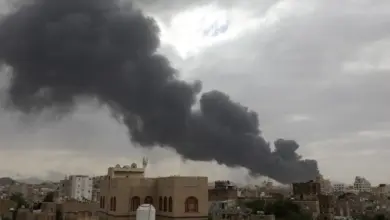Sanaa — Violence marred anti-government protests in Yemen on Wednesday, as thousands took to the streets of Sanaa and the country’s provincial capitals in rejection of the Gulf Cooperation Council (GCC) initiative tentatively endorsed by the regime and Yemen’s main opposition bloc.
Clashes erupted between demonstrators and republican guards in Sanaa, claiming at least 12 lives and injuring hundreds. Pro-regime forces reportedly fired AK-47’s from rooftops down to demonstrators on the ground while protesters set cars ablaze with Molotov cocktails. Thugs also kidnapped thirty of those wounded, protesters said.
“The regime uses violence and live ammunition to make the public rejection to the GCC initiative larger to achieve its aim of shirking the agreement,” the Joint Meeting Parties (JMP), the country’s opposition coalition, said in a statement on Thursday.
Protesters in Sanaa’s Tagheer (Change) Square, the epicenter of the Yemeni uprising sweeping the nation, also denounced the violence, saying President Ali Abullah Saleh continues to brutally suppress the people in order to retain power.
“Whenever there is an initiative, Saleh increases his killing of protesters,“ said Walid al-Amari, the protester elected to oversee the main stage in Tagheer Square. “Saleh won’t leave by international pressure. He will only leave at the hands of Yemenis.”
Major General Ali Mohsen, the top military officer who defected last month, urged protesters to remain patient while claiming his forces are working to ensure the violence will not escalate.
Demonstrators, who have flooded the streets of Yemen’s urban centers for the past three months, say the GCC-brokered deal serves President Saleh, in office for 33 years, and opposition parties. They say the accord is an affront to the country’s popular revolution.
“We are stronger than the political parties,” said one young protester in Sanaa. “Today is it clear that the youth are the ones who revolted. We have 13 demands that we still want negotiated.”
Youth demonstrators on Wednesday vowed to escalate an already resilient, forceful and enduring protest movement. They now pledge to block important streets in Yemen’s capital and march to “sensitive places to the state,” possibly including the presidential palace.
In defiance of the popular rejection of the GCC-orchestrated agreement, the JMP confimed on Tuesday they and the General People’s Congress (GPC), Yemen’s ruling party, will sign the agreement on the initiative next week in Riyadh.
Certain terms of the accord remain murky. “Both parties approve of the initiative. The only thing to be agreed upon is the date. We said Sunday. The JMP said Saturday. And the host said Monday,” said presidential information officer Ahmed al-Sofi.
The GCC initiative aims to resolve Yemen's political crisis by transferring power from Saleh to a designated deputy. The day the agreement is signed, the agreement says, Saleh will authorize the formation of a coalition government consisting of 50 percent GPC members, 40 percent JMP members and 10 percent independents.
The coalition government, according to the deal, will be formed within seven days of its signing. The government will then work to create a stable political environment geared towards national reconciliation and the removal of all signs of political and security tension, including an end to demonstrations and the re-admittance of defected military forces.
On the 29th day after the mutual signing, parliament will pass legislation providing legal and judicial immunity to the president, his family and high-ranking officials. The following day the president will, according to the plan, submit his resignation. Upon parliamentary approval of his resignation, power will be transferred to the vice president.
The acting president will then call for a new presidential election within 60 days and form a constitutional committee charged with authoring a new constitution. When the new constitution is finalized, Yemenis will vote on its approval by referendum. Should the country endorse the document, a time schedule will be set for new parliamentary elections.
And upon completion of parliamentary elections, the interim president will direct the majority party’s leadership to form a new government. The GCC, the United States and the European Union will, according to the plan, bear witness to the agreement’s implementation.
Immunity for Saleh, the Yemeni strongman political dissidents call corrupt and negligent, continues to be the primary reason the Yemeni street rejects the GCC-brokered plan.
“Any initiative that doesn’t include prosecuting Saleh and his regime is not acceptable,” said Hussein al-Watari, a young protester.
Political analyst Ahmed al-Zurqa says the initiative fails to address the vast majority of the protesters’ demands and, for that matter, dismisses recognition of the true force behind Yemen’s widespread uprising.
“The GCC initiative didn’t adopt the street demands at all. It showed the revolution as a political crises between two parties and only included those two parties,” al-Zurqa told the Yemen Times.
Al-Zurqa says the GCC refuses to consider the situation in Yemen a popular revolution, preferring to address the crisis as a political conflict. Gulf countries, according to al-Zurqa, will not allow someone with unknown ideological orientation to rise to power in Yemen. The Saudis, who maintain significant influence in the country, are reliant on Yemeni political cooperation to curb Islamist activity along its porous shared border.
GCC countries, al-Zurqa continued, also see the threat of contagion in the Yemeni uprising and popular unrest elsewhere throughout the region. Yemen’s neighbors are steadfastly working to keep the pro-democracy movement sweeping the Arab World outside their borders.
Al-Zurqa says Saleh’s endorsement of the deal is merely a ploy to bide time and configure a way to stay in power. JMP officials agree, saying Saleh will never respect the agreement when the time comes to relinquish the presidency.
“He is well known for not respecting agreements, just like what he did in 1993 when he agreed on unity with the south and came on 1994 with the war,” said al-Zurqa.
Some analysts consider the JMP’s endorsement a stratagem to expose Saleh’s lack of genuine willingness to leave office. But, regardless of its intentions, the country’s main opposition bloc has lost significant credibility on the street by striking a deal.
Although developments over recent days mark the best indication so far the country is edging closer towards ending its political crisis, reconciliation and stability remain a distant prospect. Even from the technical perspective.
”The ruling party rejects any compromises the president did so far. Today lots of the ruling party MPs resigned so they are not the majority anymore,” said presidential information officer al-Sofi. The number of resignations is unknown. Should enough MPs leave office, parliamentary approval of Saleh’s resignation will not be possible.
”Things are not so clear yet about this initiative,” opposition MP Shawqi al-Qadhi told Al-Masry Al-Youm.



